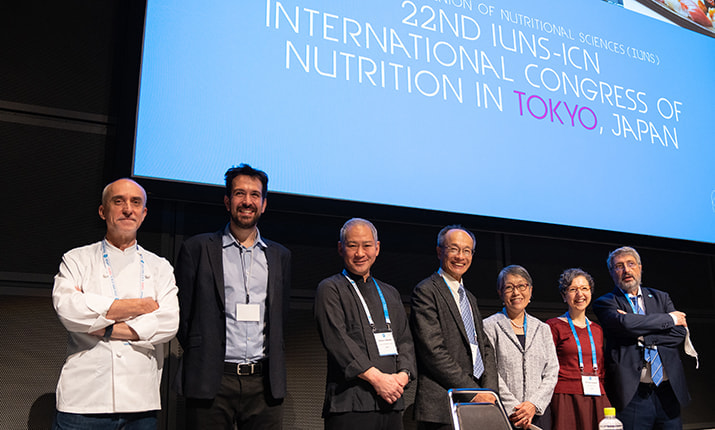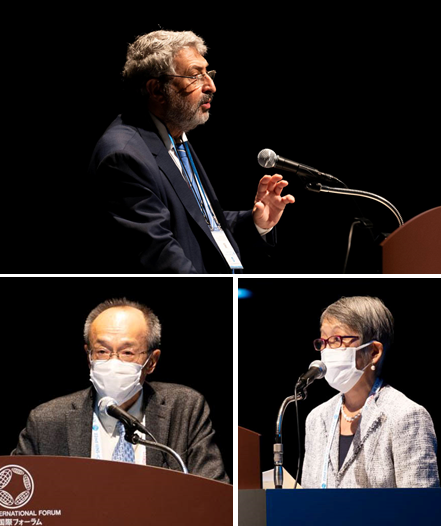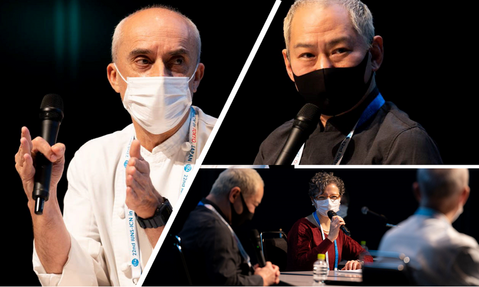Symposium on MedDiet and Washoku in the 22nd IUNS-ICN
December 2022

The Umami Information Center (UIC) held a symposium “Mediterranean and Japanese diets, two healthy gastronomic cultures with a strong umami base” on December 11, during the 22nd IUNS-ICN, International Congress of Nutrition*1 in Tokyo. The symposium was co-sponsored with El Instituto Cervantes. *2
The UNESCO recognizes different culinary traditions around the world as Intangible Cultural Heritage of Humanity. The Mediterranean and the Japanese diets stand out not only for being flavorful and rich in umami but also for promoting health and longevity. While new research findings confirm the health value of the Japanese diet, the health value of the Mediterranean diet is also being examined from various angles.
The 90-minutes symposium consisted of two parts: the first part was lectures by three researchers, and the second half was a panel discussion by two top chefs and a moderator.
The First Half
1. Opening remarks: Washoku, traditional dietary cultures of the Japanese – by Dr. Kumiko Ninomiya
2. Evidence showing the link between the Mediterranean diet and health outcomes
– by Prof. J. Alfredo Martinez
3. The important role of umami taste in oral and overall health – by Takashi Sasano
In the first half, three speakers exposed the current understanding on the health effects of these two diets.

Prof. J. Alfredo Martinez,
Prof. Takashi Sasano,
Dr. Kumiko Ninomiya
Dr. Ninomiya delivered an opening remark titled "Washoku, traditional dietary cultures of the Japanese”. Raising the points that Washoku, the traditional Japanese dietary culture, is characterized by well balanced and healthy diet using umami and very little animal fat, she explained about umami and umami rich Japanese dashi scientifically, including a comparison of the free amino acids composition of dashi with that of Western chicken bouillon.
Prof. Martinez had a lecture titled “Evidence showing the link between the Mediterranean diet and health outcomes”. He introduced the nutritional composition of the Mediterranean diet, which is characterized by olive oil, plant-based foods, sea food and yogurt, etc.
Prof. Martinez also said that the Mediterranean diet is associated not only with a reduced risk of major chronic disease, but also with health maintenance and illness prevention. He further explained that to encourage health and sustainability, the Mediterranean diet has additional social, satisfactory/satiety, security, and safety dimensions, which may be shared with other dietary pattern such as Japanese diet.
Finally, Prof. Sasano of Tohoku University who studies the use of umami in the treatment of taste disorders and dry mouth gave a presentation titled "The important role of umami taste in oral and overall health" in which he introduced examples of oral improvements due to umami. Prof. Sasano has been working on a treatment to improve the oral environment by utilizing the properties of umami, which stimulates the production of saliva.
Giving an example of treatment using umami-rich dashi for older adults suffering from poor appetite and weight loss caused by dry mouth, he said, "Umami is also related to digestion and absorption, linking the oral cavity to overall health”, "Umami is directly related to digestion and absorption because the umami has been known to facilitate gut function. Thus, umami connects oral and overall health.”
The Second Half
Panelists:
Chef Josep Barahona Vines; Spanish Restaurant “L'estudi”
Chef Chikara Yamada; Washoku Restaurant “Yamada Chikara”
Moderator: Dr. Ana San Gabriel (UIC)
In the panel discussion, two top chefs who are familiar with both Mediterranean and Japanese food cultures shared their experiences and thoughts on their cuisine. Dr. Ana San Gabriel of UIC moderated the discussion.
They talked about how they became chefs and the food experiences that led them to their current cooking style. They also shared their opinions on the similarities and differences between Spanish and Japanese foods, and how umami plays a role in their cooking.
The audience enjoyed their lively talk.

Chef Josep Barahona Vines,
Chef Chikara Yamada,
Dr. Ana San Gabriel (center)
After the symposium we got positive feedbacks from the participants saying they are interested in how the fusion of Mediterranean diets and Japanese diets would develop. All the respondents answered they would like to know more about umami.
The UIC will continue to disseminate the accurate information on the possibilities of umami and its contribution to the various food cultures.
*1: The International Congress of Nutrition is an international convention held once in four years sponsored by IUNS, the International Union of Nutritional Sciences. This time It was held from December 6 to 11 at Tokyo International Forum. It was the second time in 47 years that the congress was held in Japan.
*2: El Instituto Cervantes is the official institution established in 1991 by Spanish government in charge of promoting education of Spanish language and the cultures of Spanish-speaking countries.
